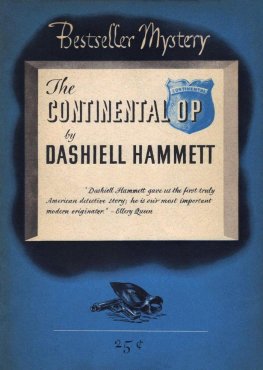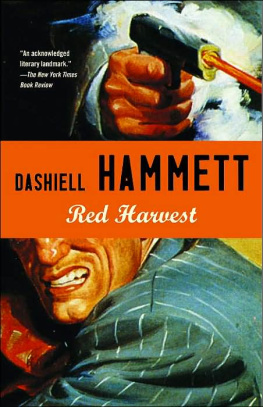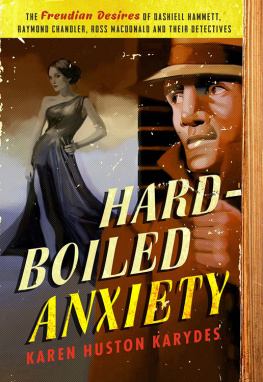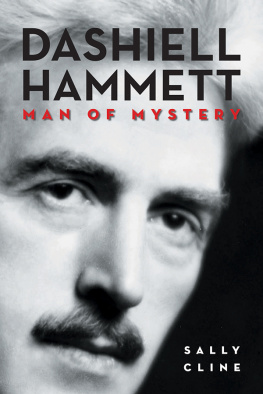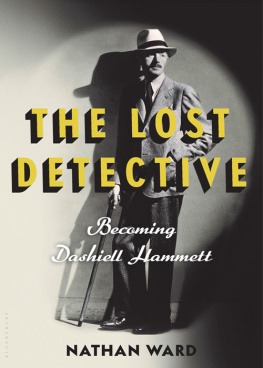Dashiell Hammett - Zigzags of Treachery
Here you can read online Dashiell Hammett - Zigzags of Treachery full text of the book (entire story) in english for free. Download pdf and epub, get meaning, cover and reviews about this ebook. genre: Humor. Description of the work, (preface) as well as reviews are available. Best literature library LitArk.com created for fans of good reading and offers a wide selection of genres:
Romance novel
Science fiction
Adventure
Detective
Science
History
Home and family
Prose
Art
Politics
Computer
Non-fiction
Religion
Business
Children
Humor
Choose a favorite category and find really read worthwhile books. Enjoy immersion in the world of imagination, feel the emotions of the characters or learn something new for yourself, make an fascinating discovery.
- Book:Zigzags of Treachery
- Author:
- Genre:
- Rating:5 / 5
- Favourites:Add to favourites
- Your mark:
- 100
- 1
- 2
- 3
- 4
- 5
Zigzags of Treachery: summary, description and annotation
We offer to read an annotation, description, summary or preface (depends on what the author of the book "Zigzags of Treachery" wrote himself). If you haven't found the necessary information about the book — write in the comments, we will try to find it.
Zigzags of Treachery — read online for free the complete book (whole text) full work
Below is the text of the book, divided by pages. System saving the place of the last page read, allows you to conveniently read the book "Zigzags of Treachery" online for free, without having to search again every time where you left off. Put a bookmark, and you can go to the page where you finished reading at any time.
Font size:
Interval:
Bookmark:

All I know about Dr. Estep's death," I said, "is the stuff in the papers." Vance Richmond's lean gray face took on an expression of distaste.
"The newspapers aren't always either thorough or accurate. I'll give you the salient points as I know them; though I suppose you'll want to go over the ground for yourself, and get your information first-hand."
I nodded, and the attorney went on, shaping each word precisely with his thin lips before giving it sound.
"Dr. Estep came to San Francisco in 1898 or 1899 a young man of twenty-five, just through qualifying for his license. He opened an office here, and, as you probably know, became in time a rather excellent surgeon. He married two or three years after he came here. There were no children. He and his wife seem to have been a bit happier together than the average.
"Of his life before coming to San Francisco, nothing is known. He told his wife briefly that he had been born and raised in Parkersburg, W. Va., but that his home life had been so unpleasant that he was trying to forget it, and that he did not like to talk or even think about it. Bear that in mind.
"Two weeks ago on the third of the month a woman came to his office, in the afternoon. His office was in his residence on Pine Street. Lucy Coe, who was Dr. Estep's nurse and assistant, showed the woman into his office, and then went back to her own desk in the reception room.
"She didn't hear anything the doctor said to the woman, but through the closed door she heard the woman's voice now and then a high and anguished voice, apparently pleading. Most of the words were lost upon the nurse, but she heard one coherent sentence. 'Please! Please!' she heard the woman cry. 'Don't turn me away!' The woman was with Dr. Estep for about fifteen minutes, and left sobbing into a handkerchief. Dr. Estep said nothing about the caller either to his nurse or to his wife, who didn't learn of it until after his death.
"The next day, toward evening, while the nurse was putting on her hat and coat preparatory to leaving for home, Dr. Estep came out of his office, with his hat on and a letter in his hand. The nurse saw that his face was pale 'white as my uniform,' she says and he walked with the care of one who takes pains to keep from staggering.
"She asked him if he was ill. 'Oh, it's nothing!' he told her. 'I'll be all right in a very few minutes.' Then he went on out. The nurse left the house just behind him, and saw him drop the letter he had carried into the mailbox on the corner, after which he returned to the house.
"Mrs. Estep, coming downstairs ten minutes later it couldn't have been any later than that heard, just as she reached the first floor, the sound of a shot from her husband's office. She rushed into it, meeting nobody. Her husband stood by his desk, swaying, with a hole in his right temple and a smoking revolver in his hand. Just as she reached him and put her arms around him, he fell across the desk dead."
"Anybody else any of the servants, for instance able to say that Mrs. Estep didn't go to the office until after the shot?" I asked.
The attorney shook his head sharply.
"No, damn it! That's where the rub comes in!"
His voice, after this one flare of feeling, resumed its level, incisive tone, and he went on with his tale.
"The next day's papers had accounts of Dr. Estep's death, and late that morning the woman who had called upon him the day before his death came to the house. She is Dr. Estep's first wife which is to say, his legal wife! There seems to be no reason not the slightest for doubting it, as much as I'd like to. They were married in Philadelphia in 1896. She has a certified copy of the marriage record. I had the matter investigated in Philadelphia, and it's a certain fact that Dr. Estep and this woman Edna Fife was her maiden name were really married.
"She says that Estep, after living with her in Philadelphia for two years, deserted her. That would have been in 1898, or just before he came to San Francisco. She has sufficient proof of her identity that she really is the Edna Fife who married him; and my agents in the East found positive proof that Estep had practiced for two years in Philadelphia.
"And here is another point. I told you that Estep had said he was born and raised in Parkersburg. I had inquiries made there, but found nothing to show that he had ever lived there, and found ample evidence to show that he had never lived at the address he had given his wife. There is, then, nothing for us to believe except that his talk of an unhappy early life was a ruse to ward off embarrassing questions."
"Did you do anything toward finding out whether the doctor and his first wife had ever been divorced?" I asked.
"I'm having that taken care of now, but I hardly expect to learn that they had. That would be too crude. To get on with my story: This woman the first Mrs. Estep said that she had just recently learned her husband's whereabouts, and had come to see him in an attempt to effect a reconciliation. When she called upon him the afternoon before his death, he asked for a little time to make up his mind what he should do. He promised to give her his decision in two days. My personal opinion, after talking to the woman several times, is that she had learned that he had accumulated some money, and that her interest was more in getting the money than in getting him. But that, of course, is neither here nor there.
"At first the authorities accepted the natural explanation of the doctor's death suicide. But after the first wife's appearance, the second wife my client was arrested and charged with murder.
"The police theory is that after his first wife's visit, Dr. Estep told his second wife the whole story; and that she, brooding over the knowledge that he had deceived her, that she was not his wife at all, finally worked herself up into a rage, went to the office after his nurse had left for the day, and shot him with the revolver that she knew he always kept in his desk.
"I don't know, of course, just what evidence the prosecution has, but from the newspapers I gather that the case against her will be built upon her fingerprints on the revolver with which he was killed; an upset inkwell on his desk; splashes of ink on the dress she wore; and an inky print of her hand on a torn newspaper on his desk.
"Unfortunately, but perfectly naturally, one of the first things she did was to take the revolver out of her husband's hand. That accounts for her prints on it. He fell as I told you just as she put her arms around him, and, though her memory isn't very clear on this point, the probabilities are that he dragged her with him when he fell across the desk. That accounts for the upset inkwell, the torn paper, and the splashes of ink. But the prosecution will try to persuade the jury that those things all happened before the shooting that they are proofs of a struggle."
"Not so bad," I gave my opinion.
"Or pretty damned bad depending on how you look at it. And this is the worst time imaginable for a thing like this to come up! Within the past few months there have been no less than five widely advertised murders of men by women who were supposed to have been betrayed, or deceived, or one thing or another.
"Not one of those five women was convicted. As a result, we have the press, the public, and even the pulpit, howling for a stricter enforcement of justice. The newspapers are lined up against Mrs. Estep as strongly as their fear of libel suits will permit. The women's clubs are lined up against her. Everybody is clamouring for an example to be made of her.
Font size:
Interval:
Bookmark:
Similar books «Zigzags of Treachery»
Look at similar books to Zigzags of Treachery. We have selected literature similar in name and meaning in the hope of providing readers with more options to find new, interesting, not yet read works.
Discussion, reviews of the book Zigzags of Treachery and just readers' own opinions. Leave your comments, write what you think about the work, its meaning or the main characters. Specify what exactly you liked and what you didn't like, and why you think so.


